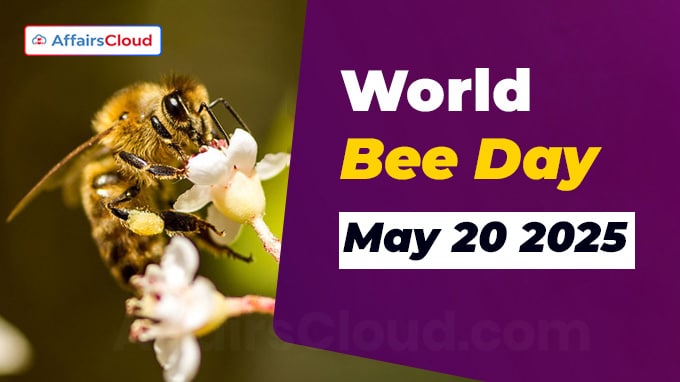 The United Nations (UN) observes World Bee Day annually on May 20 to raise awareness about the importance of bees and other pollinators in supporting biodiversity, food security, and sustainable development.
The United Nations (UN) observes World Bee Day annually on May 20 to raise awareness about the importance of bees and other pollinators in supporting biodiversity, food security, and sustainable development.
- The 2025 World Bee Day theme, “Bee inspired by nature to nourish us all”, underscores the indispensable role of bees and other pollinators in sustaining agrifood systems and ecosystem health.
Background:
i.The proposal to observe World Bee Day was initiated by the Republic of Slovenia, with the support of Apimondia (International Federation of Beekeepers’ Associations), at the Rome(Italy) basedFood and Agriculture Organization(FAO) Regional Conference for Europe in 2016.
ii.The proposal was submitted for consideration at the 40th Session of the FAO Conference in 2017.
iii. On 20 December 2017, the United Nations General Assembly (UNGA) adopted the resolution A/RES/72/211, officially proclaiming 20 May of each year as World Bee Day.
- The date, May 20 marks the birth anniversary of Anton Janša, an 18th-century Slovenian innovator renowned for pioneering modern apiculture techniques.
iv.The first World Bee Day was celebrated on 20 May 2018.
About Pollinators:
i.Pollinators are organisms that help in the transfer of pollen from the male part of a flower (anther) to the female part (stigma), enabling fertilization and seed production.
ii.Types of Pollinators:
- Insects: Honeybees, bumblebees, butterflies, moths, beetles
- Birds: Hummingbirds, sunbirds
- Mammals: Bats, monkeys, some rodents
- Wind & Water: Also act as abiotic pollinators
iii.Pollinators support biodiversity, promote plant propagation, and maintain ecological balance.
- According to the Food and Agriculture Organization (FAO), nearly 75% of the world’s food crops depend, at least in part, on pollination
iv.Threats to Pollinators
- Habitat Loss: Urbanization and intensive farming reduce pollinator-friendly spaces.
- Climate Change: Alters flowering cycles, disrupting pollination timing
- Pesticides: Chemicals like neonicotinoids harm bee populations.
- Pollution: Air and water contaminants further stress ecosystems.
About Apiculture:
i.Apiculture is the scientific method of rearing and managing honeybees for the production of honey, beeswax, royal jelly, propolis, and other bee products.
ii.Apiculture plays a vital role in income generation, especially in rural areas, by providing employment opportunities through beekeeping and honey processing.
iii. Major Bee Species in India:
- Apis cerana indica (Indian honey bee)
- Apis dorsata (Rock bee)
- Apis florea (Little bee)
- Apis mellifera (European/Western honey bee – introduced species used for commercial beekeeping)
Indian Government Support:
The National Beekeeping and Honey Mission (NBHM), launched in 2020 under the Ministry of Agriculture & Farmers’ Welfare(MoA&FW), promotes apiculture by providing training, financial assistance, and infrastructure support.
- In Gujarat, over 11,300 farmers have benefitted from a financial package of Rs.8.76 crore for setting up bee colonies, hives, and honey extraction units.
i.Production:From 76,150 metric tonnes(MT) in 2013-14 to 1,20,000 metric tonnes(MT) in 2019-20, marking a 57.58% increase.Press Information Bureau
ii.Export Growth: Honey exports rose from 28,378.42 MT in 2013-14 to 59,536.74 MT in 2019-20, a 109.80% increase.
iii.Laboratory Establishments: Two world-class honey testing labs have been set up at National Dairy Development Board (NDDB), Anand, Gujarat, and Indian Institute of Horticultural Research (IIHR), Bengaluru, Karnataka.
About Food and Agriculture Organization (FAO)
FAO is a specialized agency of the United Nations (UN) that leads international efforts to defeat hunger, improve food security, and promote sustainable agriculture.
Director-General(DG) – Qu Dongyu
Headquarters – Rome, Italy
Established on – 16 October 1945




